Discover The Woodpreneur Podcast
The Woodpreneur Podcast

The Woodpreneur Podcast
Author: Acres of Timber
Subscribed: 192Played: 8,242Subscribe
Share
© 2020 Hustle for Good Network
Description
We cover the business and marketing side of the woodworking, sawmill, tree service, furniture making, Urban Wood, and woodworking industry. If you're a woodworker, sawmill owner, or any other entrepreneur and/or business owner in the wood industry, you need to check out this podcast.
Each week, we interview business owners, large-scale companies, entrepreneurs, makers, and designers while also offering marketing and business advice that will help you grow your business and increase your profits. Tune in every week!
Join our free and private Facebook Group!
468 Episodes
Reverse
In this episode of the Woodpreneur Podcast, host Jennifer Alger interviews Kyle Jeske, the sales and purchasing manager of Richardson Hardwoods.
They discuss Kyle's journey into the lumber industry, the unique business model of Richardson Hardwoods, and the challenges and opportunities facing the lumber sector today.
Kyle shares insights on the importance of sustainability, the legacy of Richardson Industries, and the need for new talent in the industry.
The conversation also touches on networking, industry conferences, and the economic challenges that impact sales.
Kyle emphasizes the value of education in promoting sustainable forestry practices and the importance of building relationships in the business.
Takeaways
Kyle Jeske is a sales and purchasing manager at Richardson Hardwoods LLC.He has a background in business and marketing education.Kyle lived in Spain for several years, teaching English before entering the lumber industry.His Spanish skills may help in future market expansions.Richardson Hardwoods has a unique three-pronged business model.The company partners with a sawmill in Kentucky for kiln-dried inventory.Kyle aims to help smaller sawmills expand their market reach.The lumber industry faces challenges due to an aging workforce.Sustainability in forestry is crucial for the future of the industry.Building relationships and trust is essential in the lumber business.
Chapters
00:00 Introduction to Richardson Hardwoods02:52 Kyle's Journey into the Lumber Industry05:45 The Business Model of Richardson Hardwoods08:51 Challenges and Opportunities in the Lumber Industry11:45 The Legacy of Richardson Industries14:46 Exciting Developments in the Lumber Sector17:57 Future Growth and Market Expansion20:34 Networking and Industry Conferences23:41 The Aging Industry and Need for New Blood26:42 Sustainability and Education in Forestry29:40 Overcoming Economic Challenges32:37 Reflections on Career Growth35:10 Connecting with Richardson Hardwoods
The Woodpreneur Podcast brings stories of woodworkers, makers, and entrepreneurs turning their passion for wood into successful businesses - from inspiration to education to actionable advice. Hosted by Steve Larosiliere and Jennifer Alger
For blog posts and updates: woodpreneur.com
See how we helped woodworkers, furniture-makers, millwork and lumber businesses grow to the next level: woodpreneurnetwork.com
Empowering woodpreneurs and building companies to grow and scale: buildergrowth.io
Connect with us at:
Instagram: https://www.instagram.com/woodpreneurnetwork/?hl=en
Facebook: https://www.facebook.com/woodpreneurnetwork/
Join Our Facebook Group! https://www.facebook.com/groups/woodpreneurnetwork
Join our newsletter: podcast.woodpreneur.com/
You can connect with Kyle at:
www.richardsonhardwoods.com
https://www.instagram.com/richardsonhardwoodsllc/
In this episode of the Woodpreneur podcast, host Jennifer Alger interviews Patrick Chovan from Omega Lumber.
They discuss the history and growth of Omega Lumber, the challenges and opportunities in the lumber industry, and the importance of sustainable forestry practices. Patrick shares insights into the company's operations, including their focus on industrial-grade lumber and the impact of tariffs on the export market.
The conversation also touches on the future of the industry and the role of smaller producers in filling gaps left by larger mills.
Takeaways
Omega Lumber is celebrating its 50th year in business.The company operates five facilities and manages 5,000-10,000 acres of timberland.Patrick Chovan emphasizes the importance of sustainable forestry practices.The export market is challenging due to tariffs and market unpredictability.Omega Lumber focuses on industrial-grade lumber and specialty products.Patrick Chovan grew up in the logging industry and took over the company 10 years ago.The lumber industry has seen massive consolidation, with a 75% reduction in production.Smaller producers may play a key role in the industry's future.Sustainable forestry is better for the environment than poor forest management.Personal relationships and integrity are crucial in the lumber business.
Chapters
00:00 Introduction and Welcome01:00 History of Omega Lumber03:00 Operations and Facilities05:00 Sustainable Practices and Challenges08:00 Industry Trends and Future Outlook11:00 Personal Journey and Leadership
The Woodpreneur Podcast brings stories of woodworkers, makers, and entrepreneurs turning their passion for wood into successful businesses - from inspiration to education to actionable advice. Hosted by Steve Larosiliere and Jennifer Alger
For blog posts and updates: woodpreneur.com
See how we helped woodworkers, furniture-makers, millwork and lumber businesses grow to the next level: woodpreneurnetwork.com
Empowering woodpreneurs and building companies to grow and scale: buildergrowth.io
Connect with us at:
Instagram: https://www.instagram.com/woodpreneurnetwork/?hl=en
Facebook: https://www.facebook.com/woodpreneurnetwork/
Join Our Facebook Group! https://www.facebook.com/groups/woodpreneurnetwork
Join our newsletter: podcast.woodpreneur.com/
You can connect with Patrick at:
https://www.omegalumber.com/
https://www.instagram.com/omegalumber/
https://www.instagram.com/direct/t/106488327415632/
In this episode of the Woodpreneur Podcast, host Jennifer Alger speaks with Alyssa Olson, a landscape architect and furniture designer, about the importance of urban, salvaged, and reclaimed wood.
They discuss the challenges of getting these materials specified in projects, the significance of building relationships within the architecture, engineering, and construction (AEC) community, and the role of sustainability in material choices.
Alyssa shares her journey in the field, the need for standards and specifications for reclaimed wood, and the importance of trust in sourcing materials.
The conversation highlights the future of urban wood and the collaborative efforts needed to promote its use in design and construction.
Takeaways
Urban wood is crucial for sustainability and local economies.Alyssa Olson has a background in architecture and landscape design.The status quo in material sourcing often hinders the use of reclaimed wood.A specification for reclaimed wood is currently lacking.Building relationships in the AEC community is essential for sourcing materials.Trust is a significant factor in using new or unfamiliar materials.Sustainability is increasingly important in material decisions.Standards and chain of custody are vital for urban wood utilization.Education about material sourcing can help overcome barriers.Collaboration is key to promoting urban salvaged wood.
Chapters
00:00 Introduction to Urban Wood and Its Importance
03:02 Alyssa Olson's Journey and Expertise
05:42 Challenges in Specifying Urban Wood
08:27 Building Relationships in the AEC Community
11:14 The Importance of Trust in Material Sourcing
13:55 Sustainability and Regenerative Materials
16:33 The Role of Standards and Chain of Custody
19:16 Future of Urban Salvaged Wood
22:17 Conclusion and Future Collaborations
The Woodpreneur Podcast brings stories of woodworkers, makers, and entrepreneurs turning their passion for wood into successful businesses - from inspiration to education to actionable advice. Hosted by Steve Larosiliere and Jennifer Alger
For blog posts and updates: woodpreneur.com
See how we helped woodworkers, furniture-makers, millwork and lumber businesses grow to the next level: woodpreneurnetwork.com
Empowering woodpreneurs and building companies to grow and scale: buildergrowth.io
Connect with us at:
Instagram: https://www.instagram.com/woodpreneurnetwork/?hl=en
Facebook: https://www.facebook.com/woodpreneurnetwork/
Join Our Facebook Group! https://www.facebook.com/groups/woodpreneurnetwork
Join our newsletter: podcast.woodpreneur.com/
In this episode, you'll meet Clay Miller, fifth-generation lumber professional and head of sales and purchasing at Aurora Timberland, the hardwood distribution brand of Alexandria Moulding.
Clay shares how he went from stacking lumber in his family's mill to struggling through his first months in sales—then finding success by selling authentically and building long-term relationships.
He opens up about the collapse of his family business after a fire, his path back into the industry, and what it takes to run a customer-obsessed distribution operation across time zones.
Clay also breaks down the state of the hardwood industry with striking clarity. He explains why production has fallen from roughly 16 billion board feet at the height of COVID demand to under 4 billion today, and what must happen—promotion, education, and capacity-building—to bring the market back.
You'll hear how a five-word Instagram DM led Aurora Timberland into the Vietnam market, why he answers every inquiry, and his practical advice for woodpreneurs: build relationships now, make the tough cold calls, and be ready when demand cycles back.
Top 5 Key Topics:
Clay's path: fifth-generation lumber legacy, early sales missteps, and learning to sell "as himself"The industry's contraction: from ~16B to <4B board feet and the rise of substitute productsVietnam expansion: how a social media DM became a sold-out walnut programSales lessons: persistence, cold-call wins, and positioning for the next market upcycleActionable advice for woodpreneurs: expand your footprint now; don't wait for demand to return
Chapters
00:00 Introduction to Clay Miller and Aurora Timberland
03:03 Clay's Journey in the Lumber Industry
05:58 Understanding Aurora Timberland's Operations
08:49 The Importance of Family-Owned Businesses
11:51 The Role of the Hardwood Industry in Rural America
14:52 Challenges Facing the Hardwood Industry
17:57 The Importance of Education in Promoting Wood Products
21:07 Overcoming Challenges in the Wood Industry
23:35 The Power of Social Media in Business
29:05 Trends and Future of the Lumber Market
31:30 The Art of Cold Calling
35:21 Customer Service and Empathy in Business
36:58 Connecting on Social Media and Final Thoughts
The Woodpreneur Podcast brings stories of woodworkers, makers, and entrepreneurs turning their passion for wood into successful businesses - from inspiration to education to actionable advice. Hosted by Steve Larosiliere and Jennifer Alger
For blog posts and updates: woodpreneur.com
See how we helped woodworkers, furniture-makers, millwork and lumber businesses grow to the next level: woodpreneurnetwork.com
Empowering woodpreneurs and building companies to grow and scale: buildergrowth.io
Connect with us at:
Instagram: https://www.instagram.com/woodpreneurnetwork/?hl=en
Facebook: https://www.facebook.com/woodpreneurnetwork/
Join Our Facebook Group! https://www.facebook.com/groups/woodpreneurnetwork
Join our newsletter: podcast.woodpreneur.com/
You can connect with Clay at:
Instagram @AuroraTimberland
LinkedIn: Clayton Miller
In this episode of the Woodpreneur Podcast, host Jennifer Alger interviews Anthony Saraceno, the operating partner at Real Antique Wood.
Anthony shares the journey of his family-owned business, which specializes in reclaimed wood products. He discusses the company's origins, the process of reclaiming and repurposing wood, and the importance of storytelling in their business.
Anthony also highlights the challenges and successes of running a small, tight-knit team and their plans for the future.
Top 5 Takeaways:
Family-Owned Business: Real Antique Wood is a family-operated business that has been thriving for 15 years, focusing on reclaimed wood products.Reclaimed Wood Process: The company sources wood from various structures, including barns and factories, and emphasizes the importance of preserving the history and provenance of each piece.Operational Challenges: Anthony discusses the challenges of kiln drying and the importance of streamlining processes to improve efficiency.Future Expansion: The company aims to expand its operations with additional storefronts while continuing to refine their processes.Industry Collaboration: The business emphasizes the value of collaboration with like-minded individuals and companies in the industry.
Chapters:
00:00 Introduction to Real Antique Wood
02:10 The Family-Owned Business and Its Beginnings
05:45 Reclaimed Wood Process and Challenges
10:20 Equipment and Technology in Use
15:00 Marketing and Community Engagement
20:30 Overcoming Business Obstacles
25:15 Future Aspirations and Expansion Plans
30:00 The Importance of Provenance and Storytelling
35:40 Closing Remarks and Contact Information
The Woodpreneur Podcast brings stories of woodworkers, makers, and entrepreneurs turning their passion for wood into successful businesses - from inspiration to education to actionable advice. Hosted by Steve Larosiliere and Jennifer Alger
For blog posts and updates: woodpreneur.com
See how we helped woodworkers, furniture-makers, millwork and lumber businesses grow to the next level: woodpreneurnetwork.com
Empowering woodpreneurs and building companies to grow and scale: buildergrowth.io
Connect with us at:
Instagram: https://www.instagram.com/woodpreneurnetwork/?hl=en
Facebook: https://www.facebook.com/woodpreneurnetwork/
Join Our Facebook Group! https://www.facebook.com/groups/woodpreneurnetwork
Join our newsletter: podcast.woodpreneur.com/
You can connect with Anthony at:
https://realantiquewood.com/
https://www.instagram.com/realantiquewoodmill/
https://www.facebook.com/RealAntiqueWood/
In this episode of the Woodpreneur Podcast, Jennifer Alger interviews Ken Breon from Lumber Capital Log Yard.
They discuss the journey of transforming a small family-run sawmill into a successful business, the dynamics of working as a family, the importance of technology and diversification in the lumber industry, and the impact of COVID-19 on their operations.
Ken shares insights on future growth strategies, the evolution of their YouTube channel, and offers valuable advice for aspiring entrepreneurs.
Key Takeaways
Family dynamics play a crucial role in business success, requiring clear communication and defined roles.Investing in modern technology has significantly improved operational efficiency and safety.Diversification of products helps offset costs and creates additional revenue streams beyond traditional lumber.COVID-19 presented both challenges and unexpected growth opportunities for the business.Building an authentic YouTube presence requires genuine knowledge and passion for your industry.
Chapters
00:00 Introduction to Lumber Capital Log Yard
02:02 The Family Business Dynamics
05:32 Evolution of the Sawmill Business
12:20 Diversification and Revenue Streams
18:37 Investing in Technology and Equipment
24:27 Community and Support in the Industry
25:17 Family Legacy in the Lumber Business
28:06 Enhancing Safety and Efficiency with Technology
30:18 Future Growth and Value Addition Strategies
33:45 The Unexpected Journey of a YouTube Channel
44:53 Passion as the Driving Force in Business
The Woodpreneur Podcast brings stories of woodworkers, makers, and entrepreneurs turning their passion for wood into successful businesses - from inspiration to education to actionable advice. Hosted by Steve Larosiliere and Jennifer Alger
For blog posts and updates: woodpreneur.com
See how we helped woodworkers, furniture-makers, millwork and lumber businesses grow to the next level: woodpreneurnetwork.com
Empowering woodpreneurs and building companies to grow and scale: buildergrowth.io
Connect with us at:
Instagram: https://www.instagram.com/woodpreneurnetwork/?hl=en
Facebook: https://www.facebook.com/woodpreneurnetwork/
Join Our Facebook Group! https://www.facebook.com/groups/woodpreneurnetwork
Join our newsletter: podcast.woodpreneur.com/
You can connect with Ken at:
https://www.lumbercapital.com/
https://www.facebook.com/IronwoodAcresTimberHarvest/
https://www.instagram.com/lumbercapitallogyard/
https://www.youtube.com/channel/UC3LT-e7q8bRr4bf2OUrglDw
In this episode of the Woodpreneur Podcast, Jennifer Alger interviews Julie Stelman, co-founder of AncesTREE, discussing her journey from a background in forestry and education to creating an innovative inventory management system for the wood industry.
They explore the challenges faced in building AncesTREE, the importance of understanding customer needs, and the revolutionary marketplace that allows multiple sawmills to sell their products efficiently.
Julie shares insights on overcoming personal and professional obstacles, the significance of the name AncesTREE, and offers advice for sawmill companies hesitant to adopt new technologies.
Takeaways
Julie transitioned from wildlife technician to co-founding AncesTREEAncesTREE simplifies inventory management for sawmillsUnderstanding customer needs was crucial in system developmentThe marketplace allows multiple vendors to sell wood efficientlyEmbracing technology can transform sawmill operations
Chapters
00:00 Introduction to Julie Stelman and Her Journey
02:57 From Chaos to Opportunity: The Birth of AncesTREE
05:59 Building the Inventory Management System
08:51 Understanding Customer Needs and System Automation
11:52 The Story Behind the Name: AncesTREE
14:41 Overcoming Challenges in Building AncesTREE
17:59 The Marketplace: Revolutionizing Wood Sales
20:36 Advice for Sawmill Companies: Embracing Change
The Woodpreneur Podcast brings stories of woodworkers, makers, and entrepreneurs turning their passion for wood into successful businesses - from inspiration to education to actionable advice. Hosted by Steve Larosiliere and Jennifer Alger
For blog posts and updates: woodpreneur.com
See how we helped woodworkers, furniture-makers, millwork and lumber businesses grow to the next level: woodpreneurnetwork.com
Empowering woodpreneurs and building companies to grow and scale: buildergrowth.io
Connect with us at:
Instagram: https://www.instagram.com/woodpreneurnetwork/?hl=en
Facebook: https://www.facebook.com/woodpreneurnetwork/
Join Our Facebook Group! https://www.facebook.com/groups/woodpreneurnetwork
Join our newsletter: podcast.woodpreneur.com/
You can connect with Julie at:
AncesTREE.io
Julie@ancestree.org
https://www.linkedin.com/in/julie-stelman-b99740162/
In this episode of the Woodpreneur Podcast, Jennifer Alger and Steve Larosiliere discuss the transition of hosting duties, new ventures in the wood industry, and collaborative efforts to build a sustainable lumber ecosystem in Northern California.
They explore the challenges and solutions in creating a cooperative network that benefits both sawyers and designers, emphasizing the importance of collaboration over competition.
The conversation highlights the potential for a regional lumber brand and the excitement surrounding their new project.
Takeaways
The collaboration aims to create a regional lumber ecosystem in Northern California.They are leveraging technology to build a community of buyers and sellers.The project is supported by grant funds from the Watershed Research and Training Center.The focus is on creating a sustainable network for urban lumber.The initiative promotes collaboration over competition among small businesses.
Chapters
00:00 Introduction and Transition of Podcast Hosting
02:34 Collaboration and New Ventures in Urban Wood
05:26 Building a Regional Lumber Ecosystem
10:53 Challenges and Solutions in the Lumber Industry
17:54 Vision for a Sustainable Future
The Woodpreneur Podcast brings stories of woodworkers, makers, and entrepreneurs turning their passion for wood into successful businesses - from inspiration to education to actionable advice. Hosted by Steve Larosiliere and Jennifer Alger
For blog posts and updates: woodpreneur.com
See how we helped woodworkers, furniture-makers, millwork and lumber businesses grow to the next level: woodpreneurnetwork.com
Empowering woodpreneurs and building companies to grow and scale: buildergrowth.io
Connect with us at:
Instagram: https://www.instagram.com/woodpreneurnetwork/?hl=en
Facebook: https://www.facebook.com/woodpreneurnetwork/
Join Our Facebook Group! https://www.facebook.com/groups/woodpreneurnetwork
Join our newsletter: podcast.woodpreneur.com/
In this episode of the Woodpreneur Podcast, host Jennifer Alger sits down with Zachary Wicks of Wood by Wicks to explore his journey from salvaging cedar trees to becoming a full-time wood entrepreneur.
Discover how Zachary transitioned from remodeling homes to owning his own sawmill, and learn about his unique approach to sustainable forestry and custom milling.
Zachary shares insights into the challenges and rewards of the wood industry, emphasizing the importance of selective harvesting and the value of trees.
Tune in for an inspiring conversation about passion, perseverance, and the future of sustainable wood practices.
Key Takeaways:
Zachary Wicks transitioned from remodeling homes to full-time wood entrepreneurship, driven by his passion for milling and sustainable forestry.He emphasizes the importance of selective harvesting, focusing on trees that are at the end of their life cycle or are degraded, to ensure sustainable practices.Zachary's business model involves custom milling and selling dry wood, with a focus on maintaining low overhead costs and maximizing the use of each tree.He highlights the challenges of the wood industry, including the need for proper equipment and the impact of external factors like weather on wood drying processes.Zachary advocates for replanting trees and educating others about sustainable forestry to ensure the long-term health of forests and the wood industry.
Chapters:
00:00 Introduction to Zach Wicks and Wick Woods
03:00 From Remodeling to Woodworking
06:00 The Decision to Buy a Sawmill
09:00 Sustainable Forestry and Selective Harvesting
12:00 Custom Milling and Business Model
15:00 Challenges in the Wood Industry
18:00 Advocacy for Replanting and Future Vision
21:00 Personal Insights and Family Balance
The Woodpreneur Podcast brings stories of woodworkers, makers, and entrepreneurs turning their passion for wood into successful businesses - from inspiration to education to actionable advice. Hosted by Steve Larosiliere and Jennifer Alger
For blog posts and updates: woodpreneur.com
See how we helped woodworkers, furniture-makers, millwork and lumber businesses grow to the next level: woodpreneurnetwork.com
Empowering woodpreneurs and building companies to grow and scale: buildergrowth.io
Connect with us at:
Instagram: https://www.instagram.com/woodpreneurnetwork/?hl=en
Facebook: https://www.facebook.com/woodpreneurnetwork/
Join Our Facebook Group! https://www.facebook.com/groups/woodpreneurnetwork
Join our newsletter: podcast.woodpreneur.com/
You can connect with Zachary at:
https://www.instagram.com/woodbywicks/
https://www.facebook.com/woodbywicks/?ref=_xav_ig_profile_page_web#
In this episode of the Woodpreneur Podcast, we delve into the inspiring work of The Watershed Research and Training Center, a beacon of community development and environmental stewardship.
Discover how this organization empowers local communities through innovative training programs and sustainable practices. From restoring natural habitats to fostering economic resilience, The Watershed Research and Training Center is at the forefront of creating a harmonious balance between people and nature.
Join us as we explore their impactful initiatives and the stories of transformation that are shaping a sustainable future, featuring insights from Clarke Stevenson.
Key Takeaways:
The Watershed Research and Training Center plays a crucial role in balancing community needs with environmental conservationInnovative training programs are central to empowering local communitiesSustainable practices are essential for long-term ecological and economic resilienceCollaboration and community involvement are key to successful environmental stewardship
Chapters:
00:00 Introduction to The Watershed Research and Training Center
02:15 Community Development Initiatives
07:30 Environmental Stewardship Programs
12:45 Success Stories
18:00 Future Goals and Challenges - Understand the center's future plans and the challenges they face
The Woodpreneur Podcast brings stories of woodworkers, makers, and entrepreneurs turning their passion for wood into successful businesses - from inspiration to education to actionable advice. Hosted by Steve Larosiliere and Jennifer Alger
For blog posts and updates: woodpreneur.com
See how we helped woodworkers, furniture-makers, millwork and lumber businesses grow to the next level: woodpreneurnetwork.com
Empowering woodpreneurs and building companies to grow and scale: buildergrowth.io
Connect with us at:
Instagram: https://www.instagram.com/woodpreneurnetwork/?hl=en
Facebook: https://www.facebook.com/woodpreneurnetwork/
Join Our Facebook Group! https://www.facebook.com/groups/woodpreneurnetwork
Join our newsletter: podcast.woodpreneur.com/
You can connect with Clarke at:
https://www.linkedin.com/in/clarke-stevenson-13046854/
In this episode, host Jennifer Alger explores urban wood utilization with Rick Siewert from Wood From the Hood. Rick shares how his business started from a simple dare and grew into a successful enterprise focused on sustainability and innovation in woodworking.
The conversation covers industry challenges, the importance of standards and certification, networking within the urban wood community, and exciting future developments in the field.
Key Takeaways:
Urban wood utilization offers significant environmental benefits by repurposing trees that would otherwise become wasteBuilding standards and certification systems are essential for establishing credibility in emerging industriesCollaboration and networking are crucial for overcoming challenges in niche marketsSustainable business models can emerge from unconventional beginnings and creative problem-solvingThe urban wood industry has promising growth potential with exciting developments on the horizon
Chapters:
00:00 Introduction to Urban Wood Utilization
02:15 The Birth of Wood From the Hood
08:45 Challenges in the Urban Wood Industry
15:30 The Importance of Standards and Certification
22:10 Networking and Collaboration
30:00 Future of Urban Wood
The Woodpreneur Podcast brings stories of woodworkers, makers, and entrepreneurs turning their passion for wood into successful businesses - from inspiration to education to actionable advice. Hosted by Steve Larosiliere and Jennifer Alger
For blog posts and updates: woodpreneur.com
See how we helped woodworkers, furniture-makers, millwork and lumber businesses grow to the next level: woodpreneurnetwork.com
Empowering woodpreneurs and building companies to grow and scale: buildergrowth.io
Connect with us at:
Instagram: https://www.instagram.com/woodpreneurnetwork/?hl=en
Facebook: https://www.facebook.com/woodpreneurnetwork/
Join Our Facebook Group! https://www.facebook.com/groups/woodpreneurnetwork
Join our newsletter: podcast.woodpreneur.com/
You can connect with Rick at:
https://woodfromthehood.com/
https://www.instagram.com/woodfromthehoodmpls/
https://www.facebook.com/WoodFromtheHood/
In this episode of the Woodpreneur Podcast, host Jennifer Alger speaks with Caleb and Kelly Geer of Urban Tree Merchants about their journey in the urban wood industry.
They discuss their passion for utilizing local trees, the challenges of running a woodworking business, and the importance of community partnerships.
The conversation highlights innovative projects, marketing strategies, and the significance of sustainability in woodworking. The Geers share insights on their experiences, the value of collaboration, and their vision for the future of urban wood utilization.
Top 5 Takeaways
Urban Tree Merchants started from a passion for recycling woodThe importance of community partnerships in utilizing local resourcesInnovative projects can showcase the value of urban woodMarketing strategies rely heavily on word of mouth and presenceSustainability is a key focus in the woodworking industry
Chapters
00:00 Introduction to Urban Tree Merchants
01:36 The Journey of Urban Tree Merchants
04:25 Daily Operations and Partnerships
07:38 Collaboration with the City of Arlington
10:05 Exciting Projects and Innovations
12:50 Documenting the Process
17:10 Challenges and Growth in Business
18:49 Overcoming Business Challenges
21:30 Passion for Urban Wood
23:28 Marketing Strategies for Small Businesses
24:44 Unique Selling Points of Local Wood
27:51 Leveraging Internships and Partnerships
30:30 Navigating Growth and Raw Material Supply
37:09 Collaborative Approaches to Large Projects
The Woodpreneur Podcast brings stories of woodworkers, makers, and entrepreneurs turning their passion for wood into successful businesses - from inspiration to education to actionable advice. Hosted by Steve Larosiliere and Jennifer Alger
For blog posts and updates: woodpreneur.com
See how we helped woodworkers, furniture-makers, millwork and lumber businesses grow to the next level: woodpreneurnetwork.com
Empowering woodpreneurs and building companies to grow and scale: buildergrowth.io
Connect with us at:
Instagram: https://www.instagram.com/woodpreneurnetwork/?hl=en
Facebook: https://www.facebook.com/woodpreneurnetwork/
Join Our Facebook Group! https://www.facebook.com/groups/woodpreneurnetwork
Join our newsletter: podcast.woodpreneur.com/
You can connect with Caleb and Kelly:
https://urbantreemerchants.com/about-us/
https://www.instagram.com/UrbanTreeMerchants
https://www.facebook.com/urbantreemerchants/
In this episode of the Woodpreneur Podcast, host Jennifer Alger speaks with Todd Walker, the director of marketing at NWH, who has been with the company for 38 years.
They discuss the evolution of the wood industry, particularly the commercialization of alder, changes in marketing strategies over the decades, and the importance of storytelling in connecting with consumers.
Todd shares insights on the challenges facing the wood industry, the value of quality products, and the role of women in the industry. The conversation emphasizes the need for education and communication to shift consumer perceptions and promote sustainable practices in the wood business.
Top 5 Takeaways:
Todd Walker has been with NWH for 38 years and helped pioneer the commercialization of alder woodMarketing has evolved significantly with the advent of the internet and social mediaStorytelling is crucial for connecting with consumers about wood products and their benefitsThe wood industry faces challenges from substitute products and needs better education to change consumer perceptionsQuality wood products can be more sustainable than cheaper alternatives, appealing to younger generations who value sustainability
Chapters
00:00 Introduction to Todd Walker and NWH
03:04 The Evolution of Alder and NWH's Role
06:00 Marketing Changes Over 38 Years
08:59 The Importance of Storytelling in Wood Marketing
11:56 The Shift in Consumer Perception of Wood
14:52 Challenges Facing the Wood Industry
18:04 The Value of Quality in Wood Products
21:02 The Role of Women in the Wood Industry
23:52 Connecting with the Next Generation of Consumers
26:38 Todd's Accomplishments and Leadership Philosophy
29:38 Conclusion and How to Connect with NWH
The Woodpreneur Podcast brings stories of woodworkers, makers, and entrepreneurs turning their passion for wood into successful businesses - from inspiration to education to actionable advice. Hosted by Steve Larosiliere and Jennifer Alger
For blog posts and updates: woodpreneur.com
See how we helped woodworkers, furniture-makers, millwork and lumber businesses grow to the next level: woodpreneurnetwork.com
Empowering woodpreneurs and building companies to grow and scale: buildergrowth.io
Connect with us at:
Instagram: https://www.instagram.com/woodpreneurnetwork/?hl=en
Facebook: https://www.facebook.com/woodpreneurnetwork/
Join Our Facebook Group! https://www.facebook.com/groups/woodpreneurnetwork
Join our newsletter: podcast.woodpreneur.com/
You can connect with Todd at:
https://nwh.com/
https://www.linkedin.com/in/todd-walker-505867339/
https://www.instagram.com/northwesthardwoods/
In this episode of the Woodpreneur Podcast, host Jennifer Alger interviews Matthew Arnold from KJP Select Hardwoods. They discuss Matthew's journey in the lumber industry, the evolution of e-commerce in woodworking, and the challenges of shipping and regulations.
Matthew shares insights on customer education, custom orders, and trends in the woodworking industry, including the shift away from live edge designs. The conversation also touches on the importance of marketing strategies and the unique stories that shape their business.
Top 5 Takeaways
Matthew Arnold is third generation in the lumber industry at KJP Select Hardwoods, a woodworking supply store in Ottawa.E-commerce has become a significant part of their business, though shipping lumber presents unique challenges due to its size and weight.Customer education is crucial in helping clients understand wood selection and finding value in lower-grade lumber.Design trends are shifting towards more contemporary styles over live edge furniture.The business experienced significant expansion during COVID-19, requiring robust marketing strategies in a competitive market.
Chapters
00:00 Introduction to KJP Hardwoods
02:46 Matthew's Journey in the Lumber Industry
05:29 The Challenges of Urban Lumber
08:20 Processing and Custom Orders at KJP Hardwoods
11:11 Customer Experience and Custom Table Orders
14:01 Expansion During COVID-19
16:39 Navigating Business Growth and Challenges
19:15 Challenges in Sourcing Lumber
21:04 Shifts in Design Trends
24:03 Business Milestones and Growth
25:42 Educating Customers on Wood Buying
30:22 Navigating Cross-Border Regulations
33:03 Marketing Strategies for E-commerce
The Woodpreneur Podcast brings stories of woodworkers, makers, and entrepreneurs turning their passion for wood into successful businesses - from inspiration to education to actionable advice. Hosted by Steve Larosiliere and Jennifer Alger
For blog posts and updates: woodpreneur.com
See how we helped woodworkers, furniture-makers, millwork and lumber businesses grow to the next level: woodpreneurnetwork.com
Empowering woodpreneurs and building companies to grow and scale: buildergrowth.io
Connect with us at:
Instagram: https://www.instagram.com/woodpreneurnetwork/?hl=en
Facebook: https://www.facebook.com/woodpreneurnetwork/
Join Our Facebook Group! https://www.facebook.com/groups/woodpreneurnetwork
Join our newsletter: podcast.woodpreneur.com/
You can connect with Matthew at:
https://www.instagram.com/kjpselecthardwoods/
kjpselecthardwoods.com
https://www.facebook.com/kjpselecthardwoods
In this episode of the Woodpreneur Podcast, host Jennifer Alger interviews Kevin Scheimreif, the owner of Steel and Grain. Kevin shares his journey from woodworking as a child to establishing his own custom furniture business.
He discusses the challenges he faced in pricing, sourcing materials, and navigating the woodworking industry. Kevin emphasizes the importance of creativity in his work, particularly in combining wood and steel, and shares insights on marketing strategies and customer engagement.
The conversation also touches on current design trends in woodworking and the future of his business.
Key Takeaways
He transitioned from construction to custom furniture designCombining wood and steel has become his signature styleSourcing materials locally has been beneficial for his businessBuilding relationships with clients is key to successKevin's business has been full-time since 2014
Chapters
00:00 Introduction to Kevin Scheimreif and His Journey
05:22 Crafting with Wood and Metal
10:52 Navigating Challenges in Business
16:25 The Future of Woodworking and Design Trends
The Woodpreneur Podcast brings stories of woodworkers, makers, and entrepreneurs turning their passion for wood into successful businesses - from inspiration to education to actionable advice. Hosted by Steve Larosiliere and Jennifer Alger
For blog posts and updates: woodpreneur.com
See how we helped woodworkers, furniture-makers, millwork and lumber businesses grow to the next level: woodpreneurnetwork.com
Empowering woodpreneurs and building companies to grow and scale: buildergrowth.io
Connect with us at:
Instagram: https://www.instagram.com/woodpreneurnetwork/?hl=en
Facebook: https://www.facebook.com/woodpreneurnetwork/
Join Our Facebook Group! https://www.facebook.com/groups/woodpreneurnetwork
Join our newsletter: podcast.woodpreneur.com/
You can connect with Kevin at:
https://www.instagram.com/steelandgrain/
www.steelandgrain.com
In this episode of the Woodpreneur Podcast, host Jennifer Alger interviews Ryan Moore from Urban Wood Company.
They discuss Ryan's journey into woodworking, the establishment of his business, and the unique challenges and successes he has faced.
The conversation covers the importance of sourcing and drying wood, the significance of team culture, and the impact of technology and trends in the woodworking industry. Ryan emphasizes collaboration over competition and shares insights on utilizing AI and other tools to enhance business operations.
Takeaways
Ryan's journey into woodworking began with a simple step stool for his daughter, leading to the establishment of Urban Wood Company as a one-stop shop for woodworking needs in Oklahoma City.Team culture and collaboration are fundamental to the company's success, with Ryan emphasizing the importance of educating customers about proper wood sourcing and drying techniques.Current woodworking trends like live edge and epoxy remain popular, while the company focuses on providing high-quality materials and services to local crafters.Ryan advocates for collaboration over competition in the wood industry, believing in the power of giving and working together to benefit the entire community.Technology and AI integration can significantly enhance efficiency in woodworking operations, helping business owners streamline their processes while maintaining their passion for the craft.
Chapters
00:00 Introduction to Urban Wood Company
06:07 Sourcing and Drying Wood: The Urban Wood Approach
12:00 The Importance of Team and Culture in Business
18:05 Collaboration Over Competition in the Wood Industry
24:06 Connecting with Urban Wood Company
The Woodpreneur Podcast brings stories of woodworkers, makers, and entrepreneurs turning their passion for wood into successful businesses - from inspiration to education to actionable advice. Hosted by Steve Larosiliere and Jennifer Alger
For blog posts and updates: woodpreneur.com
See how we helped woodworkers, furniture-makers, millwork and lumber businesses grow to the next level: woodpreneurnetwork.com
Empowering woodpreneurs and building companies to grow and scale: buildergrowth.io
Connect with us at:
Instagram: https://www.instagram.com/woodpreneurnetwork/?hl=en
Facebook: https://www.facebook.com/woodpreneurnetwork/
Join Our Facebook Group! https://www.facebook.com/groups/woodpreneurnetwork
Join our newsletter: podcast.woodpreneur.com/
You can connect with Ryan at:
https://www.theurbanwoodco.com/
https://www.instagram.com/theurbanwoodco
In this episode of the Woodpreneur Podcast, host Jennifer Alger speaks with Jay Peight from JointaWood, who transitioned from farming to woodworking and eventually to manufacturing machines for the woodworking industry.
Jay shares his journey of engineering a flattening machine, the challenges he faced during the boom in the sawmill industry, and his insights on market trends for live edge slabs.
He discusses the importance of building a reliable brand, the innovations in his machinery, and the balance between work and personal passion. The conversation also touches on marketing strategies and the future of his business.
Takeaways
Jay transitioned from farming to woodworking and manufacturingHe engineered a flattening machine to solve a personal problemThe woodworking industry experienced a boom during the COVID pandemicBuilding a reliable brand is crucial for long-term successMarketing visibility is a key focus for Jay's business growth
Chapters
00:00 From Farming to Woodworking: Jay's Journey
03:00 Engineering a Solution: The Birth of a Business
06:00 Navigating the Boom: Challenges and Opportunities
08:59 Building a Brand: Manufacturing and Marketing Strategies
12:04 Market Trends: The Future of Live Edge Slabs
15:01 Understanding the Industry: Insights and Challenges
17:47 Innovations in Machinery: Features and Options
21:03 Balancing Work and Passion: The Woodworker's Dilemma
24:00 Future Plans: Expanding the Business
26:52 Visibility and Growth: Marketing Strategies for Success
The Woodpreneur Podcast brings stories of woodworkers, makers, and entrepreneurs turning their passion for wood into successful businesses - from inspiration to education to actionable advice. Hosted by Steve Larosiliere and Jennifer Alger
For blog posts and updates: woodpreneur.com
See how we helped woodworkers, furniture-makers, millwork and lumber businesses grow to the next level: woodpreneurnetwork.com
Empowering woodpreneurs and building companies to grow and scale: buildergrowth.io
Connect with us at:
Instagram: https://www.instagram.com/woodpreneurnetwork/?hl=en
Facebook: https://www.facebook.com/woodpreneurnetwork/
Join Our Facebook Group! https://www.facebook.com/groups/woodpreneurnetwork
Join our newsletter: podcast.woodpreneur.com/
You can connect with Jay at:
https://www.jointawood.com/
https://www.facebook.com/JointaWoodSlabSurfacers
In this episode of the Woodpreneur Podcast, host Jennifer Alger interviews Cody McKee of Mountain Milling Co. They discuss the company's evolution from a lawn care service to a sawmill operation specializing in Eastern Red Cedar. Cody shares insights into the challenges of running a family business, the operational bottlenecks they face, and the impact of market trends on their sales. The conversation highlights the unique properties of Eastern Red Cedar and its growing popularity in various applications, as well as the dynamics of working with family in a business setting.
Cody McKee discusses the unique properties of Eastern Red Cedar, the challenges of distribution and business growth, and innovative solutions for waste management. He emphasizes the importance of collaboration within the industry and shares insights on navigating the debt trap in small business. The conversation concludes with a focus on the company's core values of kindness and service to customers.
Takeaways
Mountain Milling Co. started as a lawn service in 2001 and transitioned to sawmilling with a Norwood sawmill in 2017.Eastern Red Cedar is prevalent in their area and considered invasive, but it's valued for its rot and bug resistance, making it a popular natural alternative to pressure-treated lumber.The family-run business divides key roles among members, with Cody handling marketing and sales while his brother manages finances.COVID-19 positively impacted the wood industry, boosting their sales due to increased local demand and favorable market conditions.The company prioritizes kindness and service over profits, focusing on building industry connections and avoiding debt traps for sustainable growth.
Chapters
00:00 Introduction to Mountain Milling Co.06:40 Family Dynamics in Business13:24 Daily Operations and Responsibilities18:32 Cedar's Advantages Over Pressure-Treated Wood25:30 Collaborative Opportunities in the Industry30:41 Building Connections for Business Success35:42 The Heart of Mountain Milling Co.
The Woodpreneur Podcast brings stories of woodworkers, makers, and entrepreneurs turning their passion for wood into successful businesses - from inspiration to education to actionable advice. Hosted by Steve Larosiliere and Jennifer Alger
For blog posts and updates: woodpreneur.com
See how we helped woodworkers, furniture-makers, millwork and lumber businesses grow to the next level: woodpreneurnetwork.com
Empowering woodpreneurs and building companies to grow and scale: buildergrowth.io
Connect with us at:
Instagram: https://www.instagram.com/woodpreneurnetwork/?hl=en
Facebook: https://www.facebook.com/woodpreneurnetwork/
Join Our Facebook Group! https://www.facebook.com/groups/woodpreneurnetwork
Join our newsletter: podcast.woodpreneur.com/
You can connect with Cody at:
https://www.instagram.com/mountainmillingco/
In this episode of the Woodpreneur Podcast, host Jennifer Alger speaks with Rodney Jacobs from Unique Woods of the Northwest about the restoration of big trees in the Pacific Northwest and the collaborative efforts with the Coquille Tribe.
They discuss the ecological benefits of restoring these trees, the process of sawmilling, and the importance of creating local jobs and skills development. Rodney emphasizes the need for sustainable practices and the long-term vision required for forest restoration, highlighting the legacy that can be left for future generations.
Takeaways
Restoring big trees in the Pacific Northwest significantly benefits local ecosystems and addresses the genetic opportunity crisis caused by the loss of these ancient specimens.Collaboration with local tribes like the Coquille Tribe enhances restoration efforts by combining traditional knowledge with modern sustainable forestry practices.Sawmilling dying wood represents a sustainable practice that creates valuable products while supporting forest health and preventing waste.Diversity in forests, particularly through hardwoods rather than monoculture plantations, is crucial for ecosystem health, resilience, and long-term environmental benefits.Creating local jobs and skills development through forest restoration projects builds community capacity while fostering environmental stewardship and long-term thinking for future generations.
Chapters
00:00 Restoring Big Trees in the Pacific Northwest
03:02 The Impact of Tree Restoration on Ecosystems
06:05 Collaboration with the Coquille Tribe
09:04 The Process of Sawmilling and Wood Restoration
11:49 Creating Local Jobs and Skills Development
15:03 The Importance of Sustainable Practices
17:57 The Future of Forest Restoration
21:01 Legacy and Long-Term Thinking
24:00 Final Thoughts and Call to Action
The Woodpreneur Podcast brings stories of woodworkers, makers, and entrepreneurs turning their passion for wood into successful businesses - from inspiration to education to actionable advice. Hosted by Steve Larosiliere and Jennifer Alger
For blog posts and updates: woodpreneur.com
See how we helped woodworkers, furniture-makers, millwork and lumber businesses grow to the next level: woodpreneurnetwork.com
Empowering woodpreneurs and building companies to grow and scale: buildergrowth.io
Connect with us at:
Instagram: https://www.instagram.com/woodpreneurnetwork/?hl=en
Facebook: https://www.facebook.com/woodpreneurnetwork/
Join Our Facebook Group! https://www.facebook.com/groups/woodpreneurnetwork
Join our newsletter: podcast.woodpreneur.com/
You can connect with Rodney at:
https://www.uniquewoodsnw.com/
https://www.instagram.com/uniquewoodsnw/?igshid=YmMyMTA2M2Y%3D
In this episode of the Woodpreneur Podcast, host Jennifer Alger reconnects with Viktor Sarudi from The Stump Shop to discuss the evolution of his business, strategies for growing a social media presence, and how he monetizes his work through brand partnerships. Viktor shares insights on navigating sponsored content, understanding algorithm changes, and his marketing strategies, emphasizing the importance of quality content and consistency in social media engagement.
He discusses the challenges and rewards of balancing a part-time woodworking business with a full-time corporate job, sourcing urban wood, maintaining the integrity of wood pieces, and market trends affecting the woodworking industry. Viktor also reflects on scaling a hobby into a business and the potential for future growth while emphasizing the importance of community engagement.
Takeaways
Viktor has shifted focus from custom work to creating what he enjoys, finding that brands often pay more than individual customers for products.Growing a social media presence requires hard work, consistency, and adaptation to platform changes, with quality content being more important than chasing numbers.Instagram and Facebook are key drivers for sales in his business, with Viktor preferring to let his social media feed market itself rather than spending on advertising.Sourcing wood ethically, maintaining craftsmanship integrity, and understanding market trends are crucial for sustainability and business decisions in a competitive woodworking market.Balancing a part-time woodworking business with full-time employment requires careful time management, with future plans potentially involving a transition to focusing on woodworking full-time.
Chapters
00:00 Introduction to The Stump Shop
01:18 Viktor's Business Evolution
04:06 Growing Social Media Presence
08:17 Monetizing Through Brands
11:36 Navigating Sponsored Content
15:58 Understanding Algorithm Changes
19:49 Marketing Strategies for The Stump Shop
24:30 Navigating the Balance of Business and Life
27:29 Sourcing and Working with Urban Wood
30:52 Trends in Woodworking and Market Challenges
35:01 Scaling a Hobby into a Business
39:30 Connecting with the Community and Future Plans
The Woodpreneur Podcast brings stories of woodworkers, makers, and entrepreneurs turning their passion for wood into successful businesses - from inspiration to education to actionable advice. Hosted by Steve Larosiliere and Jennifer Alger
For blog posts and updates: woodpreneur.com
See how we helped woodworkers, furniture-makers, millwork and lumber businesses grow to the next level: woodpreneurnetwork.com
Empowering woodpreneurs and building companies to grow and scale: buildergrowth.io
Connect with us at:
Instagram: https://www.instagram.com/woodpreneurnetwork/?hl=en
Facebook: https://www.facebook.com/woodpreneurnetwork/
Join Our Facebook Group! https://www.facebook.com/groups/woodpreneurnetwork
Join our newsletter: podcast.woodpreneur.com/
You can connect with Viktor at:
https://www.instagram.com/thestumpshop/


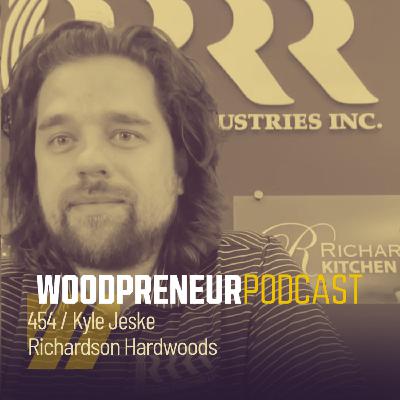
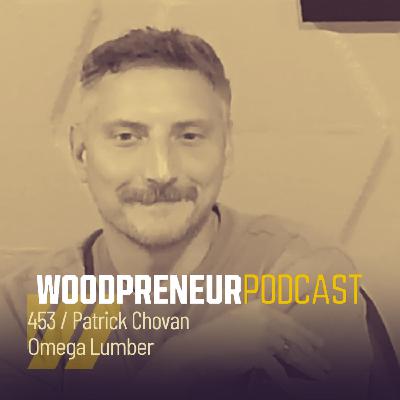


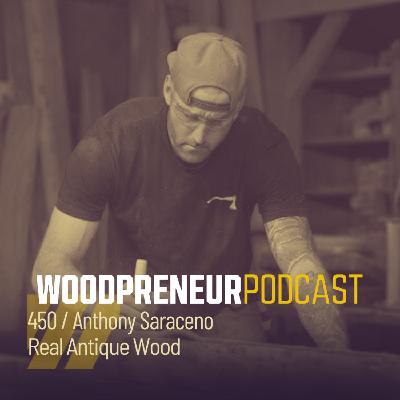
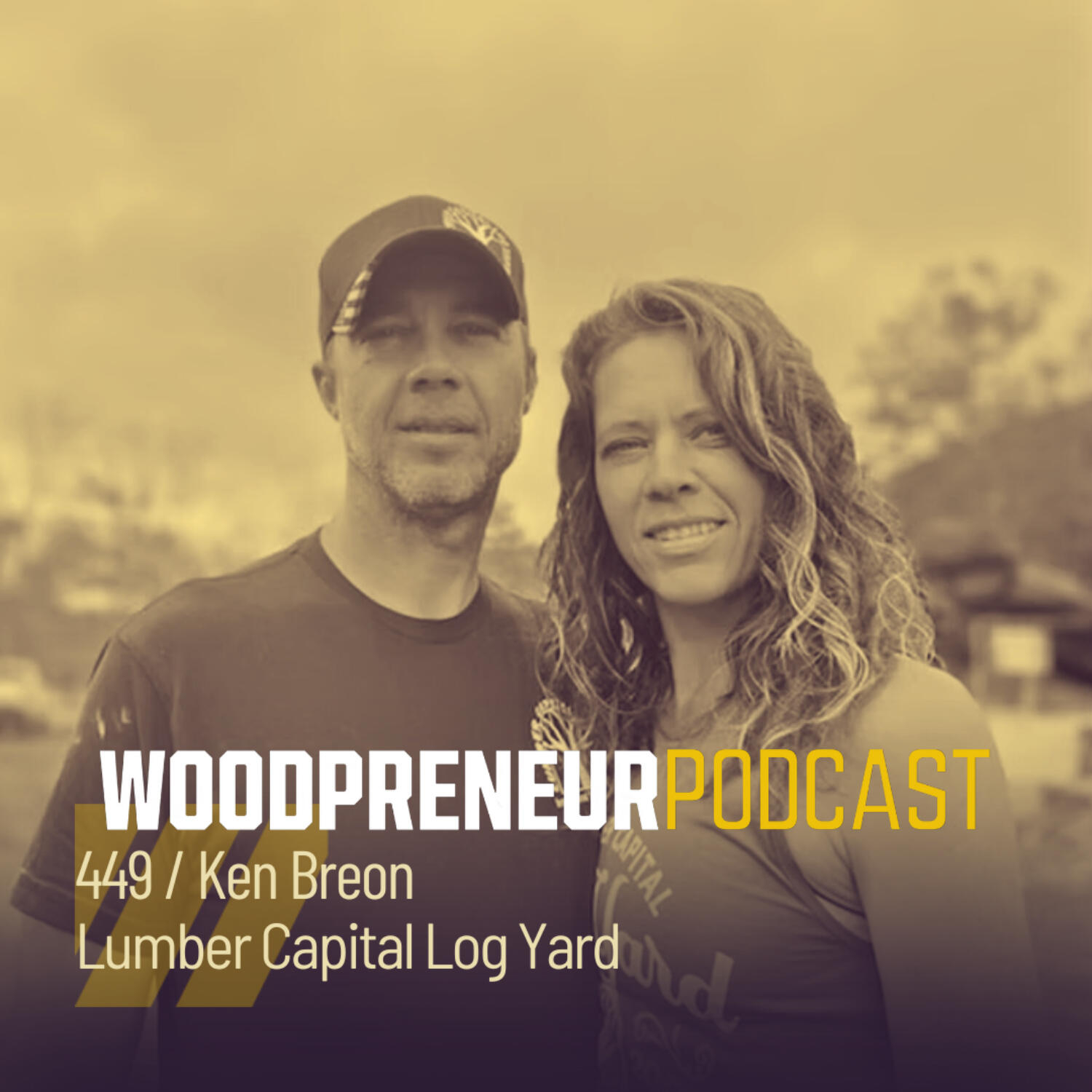
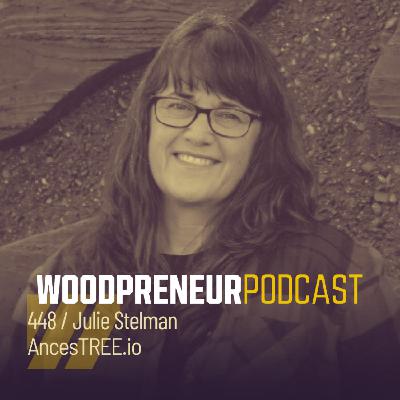
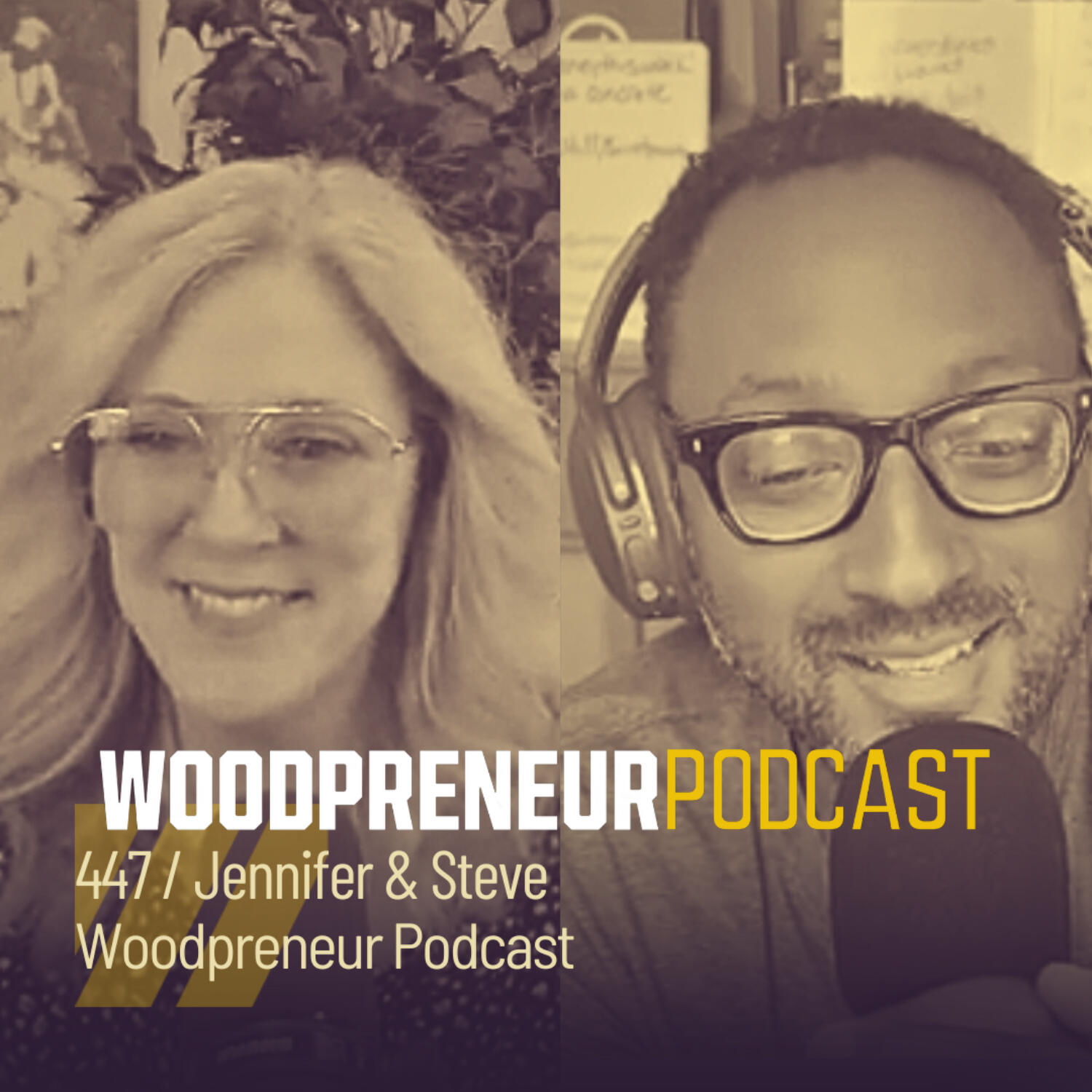
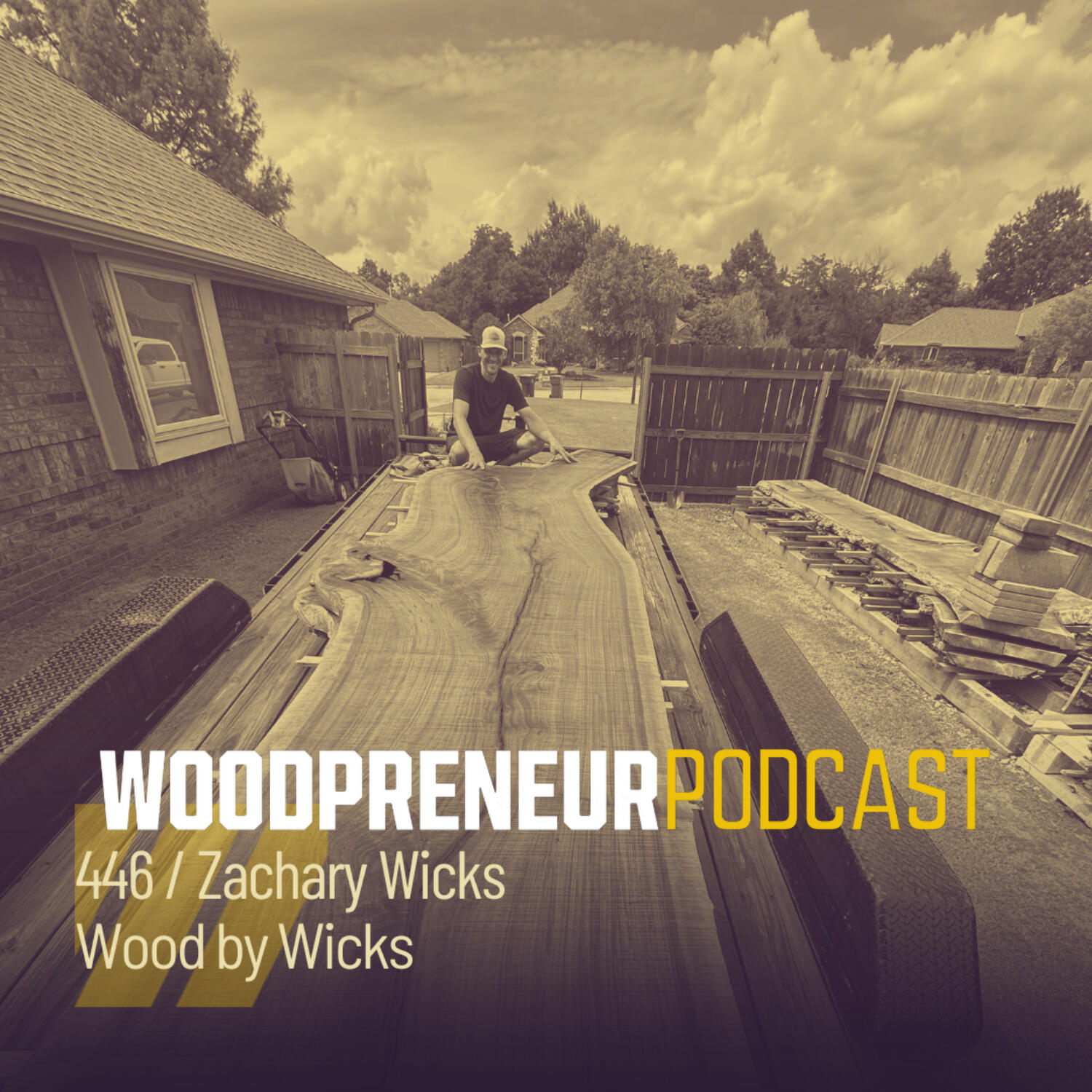
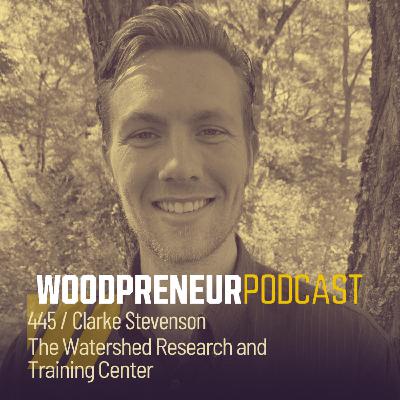
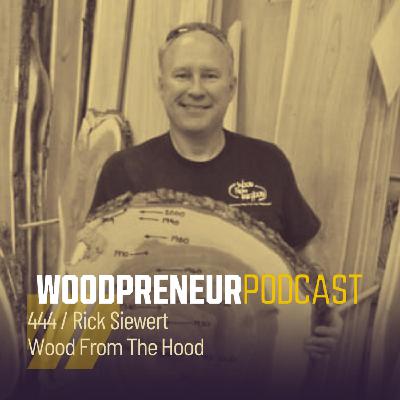
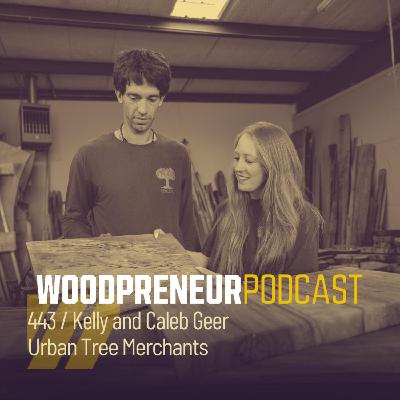

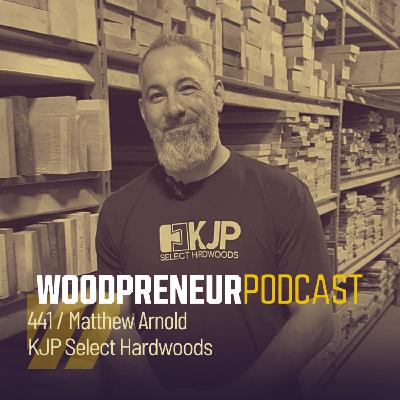
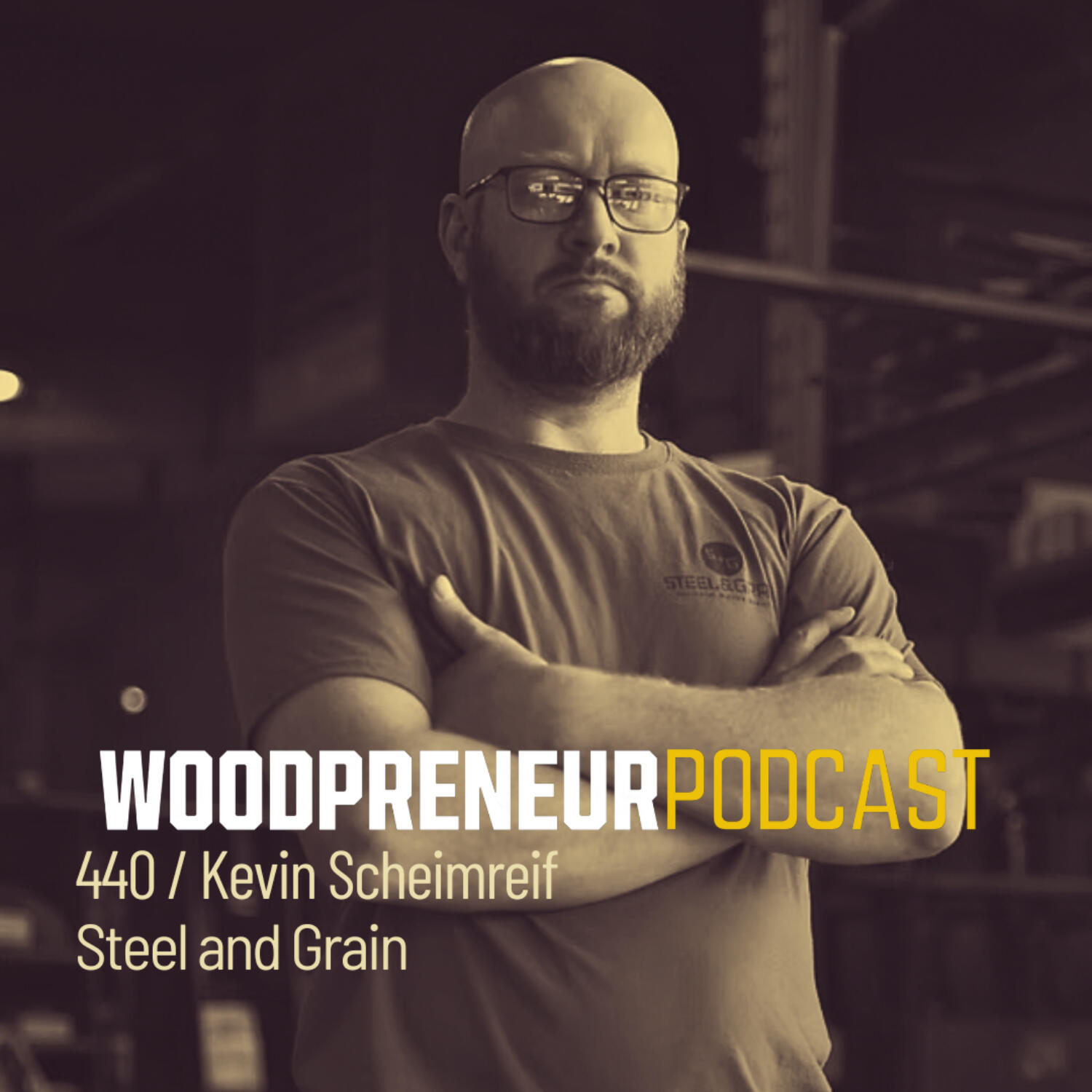
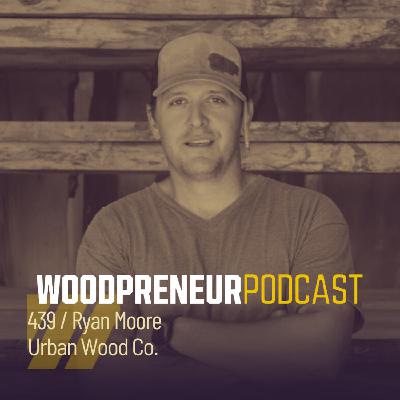
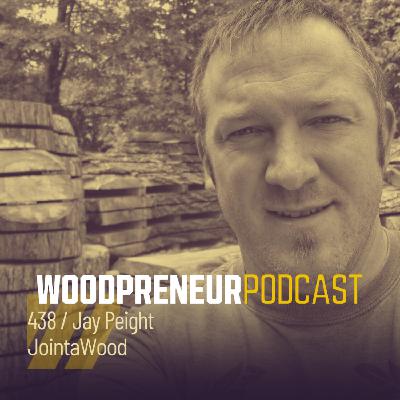
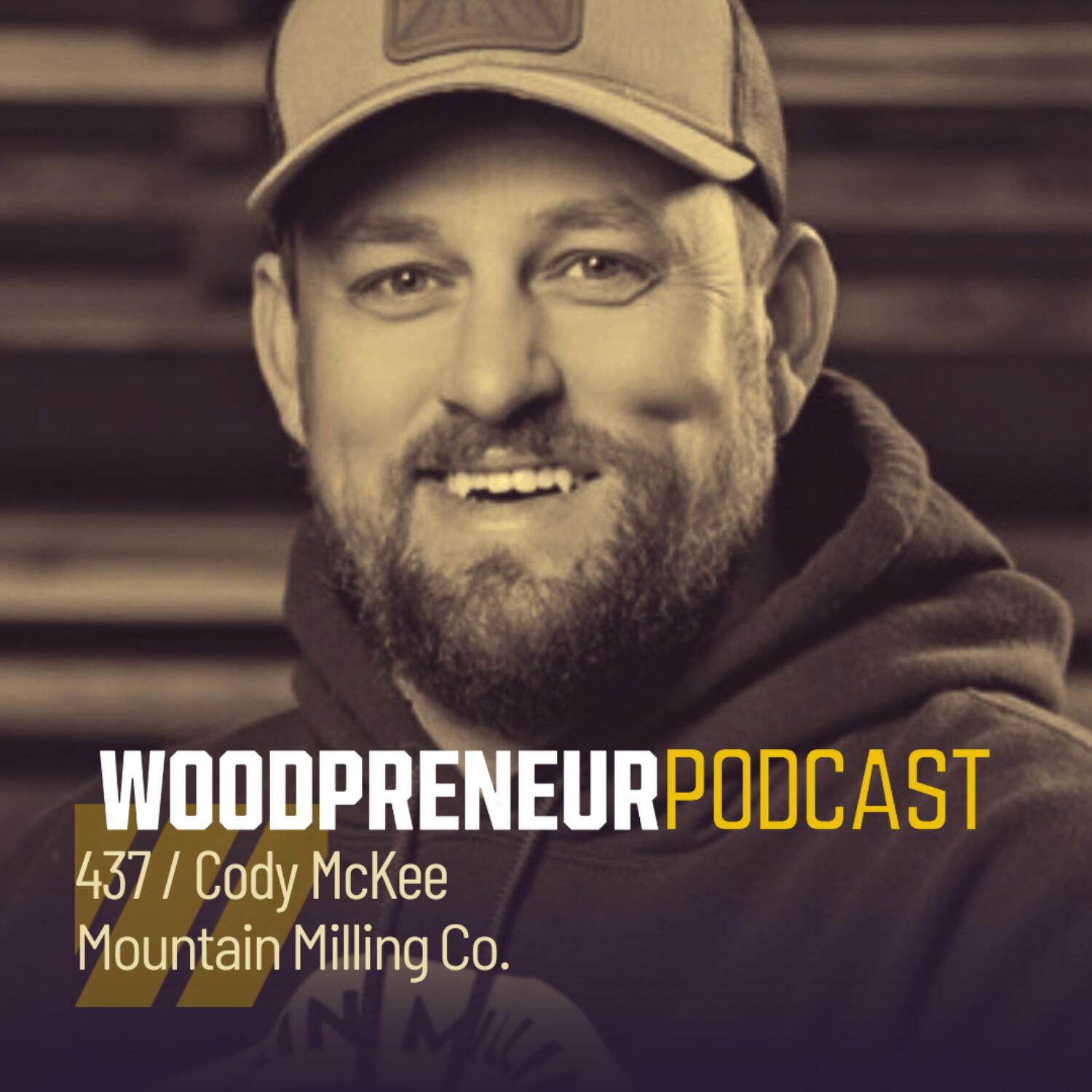
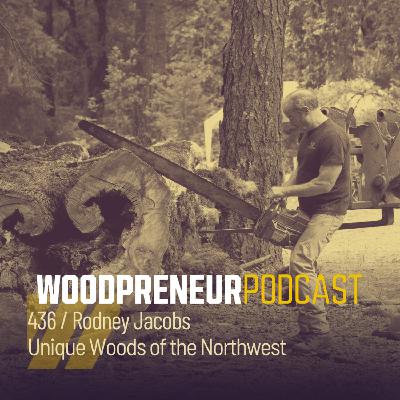
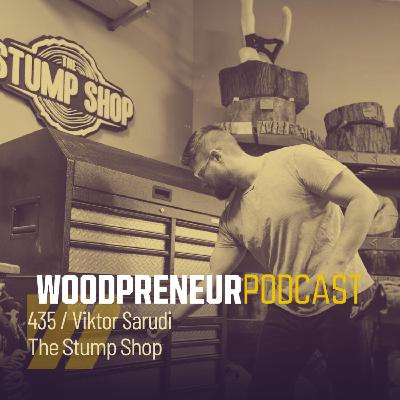



New listener. I've only listened 2 three shows and I'm amazed how you know exactly what advice your guests need. On top of that, it's relatable to the listener as well. BRAVO. So happy I found you.